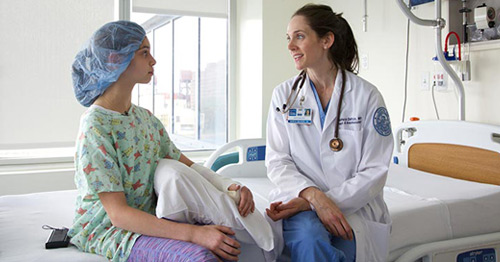MRI With Anesthesia: What to Expect
Who might have an MRI with anesthesia?
Patients with certain conditions that may prevent them from staying still in the MRI machine, such as claustrophobia, anxiety, or a condition that causes physical pain, may have an MRI with anesthesia.
It is also common for children to have an MRI with anesthesia, since it is often difficult for them to remain still. You can learn more about pediatric patients getting an MRI with anesthesia at Pediatric Anesthesia and Pain Management.
What are common misconceptions about having an MRI with anesthesia?
The most important thing to understand about getting an MRI with anesthesia is that this is a procedure and, therefore, presurgical guidelines apply. You will be given specific instructions about eating and drinking restrictions prior to the procedure and about going home when the procedure is over.
What type of anesthesia is used for MRI?
Generally, MRIs under anesthesia are performed under sedation, although sometimes they are performed under general anesthesia. Sedation is characterized as being in a state between relaxed and very sleepy, but not quite unconscious.
How should I prepare for an MRI under anesthesia?
You will be given instructions for eating and drinking before the procedure. You may also be given additional tests depending on other conditions you may have. These include the following:
- All females age 12 and above (or who have begun menstruating) will be required to provide a urine sample upon arrival for a pregnancy test.
- For patients with diabetes, a finger-stick glucose will be obtained.
- Patients with a BMI above 40 or 45 may be required to see additional physicians at HSS and/or undergo additional tests such as an echocardiogram and a HgbA1c blood test (also sometimes referred to as an Hb1c or HbA1C test) before an MRI under anesthesia can be performed.
The day before the procedure, the HSS Call Center will call you to provide instructions and answer any questions you may have. Your care team may encourage you to undergo COVID testing the day before your MRI to prevent delays the day of the procedure.
Video: Overview of MRI with Anesthesia procedures at Hospital for Special Surgery
How long does an MRI with sedation take?
MRIs take different amounts of time depending on the body part that is getting scanned. Anesthesia will add at least thirty minutes, often more. The MRI scan itself can take anywhere from 20 to 80 minutes. You can ask your care team for a time estimate for your individual procedure.
When you have anesthesia, you will need to recover in the PACU afterwards for about one to two hours.
What happens on the day of the MRI procedure?
After a pre-sedation evaluation, you will provide written consent to the anesthesiologist required for anesthesia. Two anesthesia providers, one of whom is an attending anesthesiologist, will be with you the entire time. An anesthesiologist is a medical doctor (MD) who specializes in administering anesthesia.
The other anesthesia provider may be either a certified registered nurse anesthetist (CRNA) or an HSS Anesthesia Fellow. A CRNA is an advanced practice nurse who provides anesthesia care for patients, and who assists the anesthesiologist in the MRI suite.
Our anesthesia fellows are physicians who have graduated from an anesthesiology residency program and are doing an additional year of subspecialty training to develop further expertise in their subspecialty.
An MRI nurse and an MRI technologist are also part of the team. The MRI nurse will review your ID, history, check your vital signs, insert your IV (pediatric patients will have their IVs inserted in the MRI holding area) and place you on monitors. The MRI technologist will check your ID (hospital bracelet), review your history (why you are having an MRI), and review the MRI Safety Sheet.
All of these providers will help prepare you for the procedure and take care of you while you are in the scanner. While you are in the scanner, you will be provided with earplugs, elbow pads, headphones, and blankets to keep you comfortable while you are asleep.
For your safety, you will never be left unattended by an anesthesiologist once you are sedated.
Can I return to work or school after having an MRI with anesthesia?
No. When you are discharged, you will still be very tired from the anesthesia. You will not be permitted to be discharged alone, and you will not be able to drive a car or return to work or school the same day. Please be sure to plan with your workplace or school accordingly.
What happens after the MRI procedure?
After the procedure, you will go to the Post-Anesthesia Care Unit (PACU) to recover. When you are fully awake, you will be provided with something light to eat. Recovery takes about one to two hours. When you are ready to go home, your IV will be removed, and you will be discharged with the family member or companion taking you home. You cannot be discharged on your own, drive a vehicle, or return to work or school the same day.
You may be tired for the rest of the day, and we recommend that you go home and rest.
When can I schedule an MRI with anesthesia?
At HSS, MRIs with anesthesia are performed on Thursdays, alternating each week between appointments for pediatric patients and those for adults.
Have questions?
To learn more about pediatric patients getting an MRI with anesthesia, visit Pediatric Anesthesia and Pain Management.
If you have any questions about getting an MRI with anesthesia, you can contact us at the following numbers:
- Anesthesia Office: 212.606.1206
- MRI Department: 212.606.1886
- MRI Nurse: 646.797.8260
Posted: 7/1/2021
Authors
Director of Pediatric Anesthesiology, Hospital for Special Surgery
Clinical Assistant Professor of Anesthesiology, Weill Cornell Medical College



